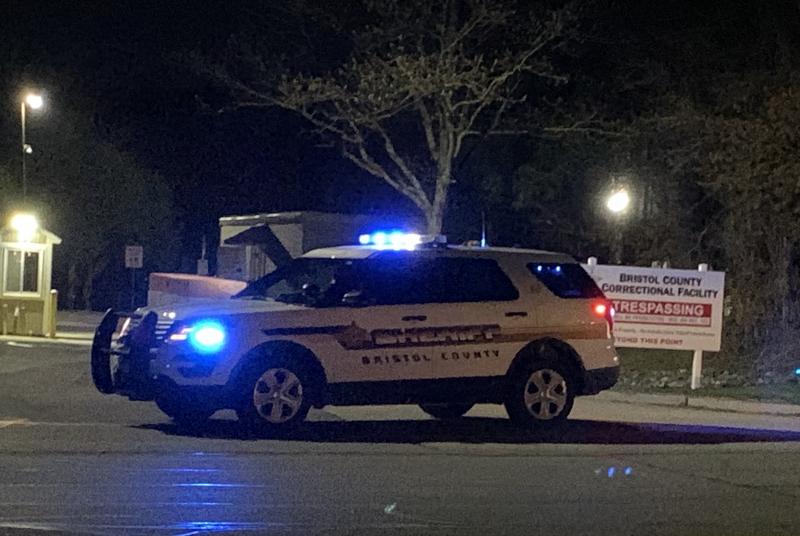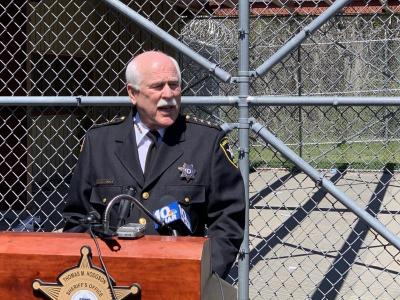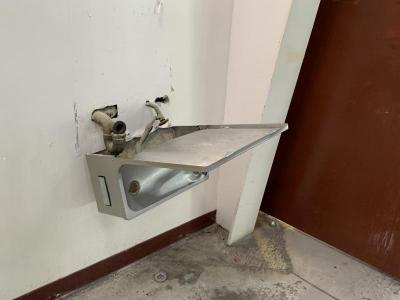Government officials weigh in on Dartmouth ICE facility conflict
This article has been updated to include the state senate committee investigation and the contents of a letter from the Massachusetts Congressional Delegation to Sheriff Hodgson.
Governor Charlie Baker and other officials have weighed in on a violent altercation that occurred May 1 at an Immigrations and Customs Enforcement facility in Dartmouth. The disturbance saw three detainees hospitalized and some $25,000 worth of damage done to the detention center.
All three detainees are expected to recover. Meanwhile a state senate committee led by Senator John Keenan and Senate President Karen Spilka will be looking into the incident, as reported by multiple news outlets.
The governor said in a May 4 press conference that the issue was on his “to-do list” for the day.
“There is a whole series of back-and-forths with respect to what happened there, and people need to be careful about drawing conclusions one way or another,” he noted.
Conflicting reports have emerged from Bristol County Sheriff Thomas Hodgson and detainees and their lawyers on the disturbance.
Other lawmakers who have spoken out on the issue include members of Massachusetts’ congressional delegation U.S. senators Elizabeth Warren and Edward Markey as well as representatives William Keating and Joseph Kennedy III. The lawmakers wrote to Hodgson on May 3 expressing their “alarm” at the incident. "There are conflicting accounts about what occurred, and we believe that there must be a full, independent investigation by an external entity," they wrote in the letter.
The congressional delegation also urged the sheriff to save relevant video recordings and to allow detainees to speak with their attorneys at once. “This includes any detained individuals who were taken to a hospital after Friday's events,” they wrote. “Their attorneys must be permitted to confidentially speak with their clients and check in on their clients' health and wellbeing."
During a May 2 press conference, the sheriff said the altercation started when ten detainees refused to go to the jail’s medical unit after they claimed to have symptoms of Covid-19.
Tensions were already high in the facility with work stoppages, a federal lawsuit against the sheriff and ten staff members testing positive for coronavirus.
A federal judge had previously ordered the release of more than 40 ICE detainees due to concerns over an outbreak of the virus in the facility, a move that Hodgson decried on Twitter.
Activists held a protest around the New Bedford District Courthouse on May 4 over the disturbance.
According to Hodgson, the incident began after he told one inmate that he had to get tested — at which point the detainee allegedly faked an injury and caused other inmates to rush at the sheriff and his officers, damaging the facility in the process. Hodgson said that detainees even hit him with a chair.
But ICE detainees involved in the disturbance disagree with this version of events, telling lawyers and family members that the sheriff and his officers attacked them and caused at least some of the damage to the facility.
One of the detainees, who didn’t want to be named, told Boston-based minister Annie Gonzalez Milliken and an attorney over the phone that it was Hodgson who began the altercation.
He alleged that the sheriff grabbed his arm and scratched him, resulting in correctional officers arriving with pepper spray.
Attorney for several ICE detainees Ira Alkalay said that the incident kicked off after two days of detainees refusing to clean the facility due to concerns over contracting Covid-19, and after hand sanitizer provided by officials ran out.
According to Alkalay, the detainees wanted to be tested for Covid-19, but the sheriff suddenly decided to test them right away, telling them to pack up without telling them why.
“They were suspicious,” Alkalay said. “They thought they were going to be put in the hole, because that happened before. They were asking ‘Why can’t we get tested here, what’s going on?’”
Hodgson said that some inmates refused to get tested because they thought the medical center was unsanitary or because they said they did not have the virus.
“These are the same people who have been calling their attorneys, advocate groups, saying that they need to be released because they’re going to get contaminated and it’s dangerous in here,” he said.
The attorney said that he was on the phone with a client when the incident happened, and the line remained open.
“I heard everything that happened in there until the phones went dark about an hour later,” he said, stating that people were crying and choking from pepper spray and that he heard his client “screaming in pain.”
A detainee at the facility also told his sister in a “desperate” phone call during the disturbance that officers were attacking inmates, destroying the facility and saying they would kill them, his sister told Dartmouth Week.
That night, she said, she was so worried that she drove for over an hour to come to Dartmouth and try to help.
“What would you do, if you were listening to your family member yell for help [on the phone]?” she asked. “Of course I drove down.”
She spoke anonymously out of fear that her brother will be punished if she speaks out, adding that she has not been able to speak with her brother since the incident.
As for how he is doing now, she said with emotion, “We don’t know. There is no communication.”
She added, “I just pray to God that he’s all right.”
Sheriff’s Office spokesperson Jonathan Darling said the Sheriff’s Department is currently investigating the incident and should have their findings in about a week.
He noted that ICE will be conducting its own investigation into the incident, and that there will be no official charges or punishments until the investigations are concluded.
Darling also said that all 26 of the detainees involved are currently being held in individual cells at the jail’s main building until the damage to the ICE facility is repaired, which could take at least a month.
Seven of the 10 detainees who initially refused the tests have since been tested, Darling stated, adding that if the remaining three continue to refuse testing “they’ll be treated as positive for cautionary purposes” and would stay in isolated cells for 14 days.














